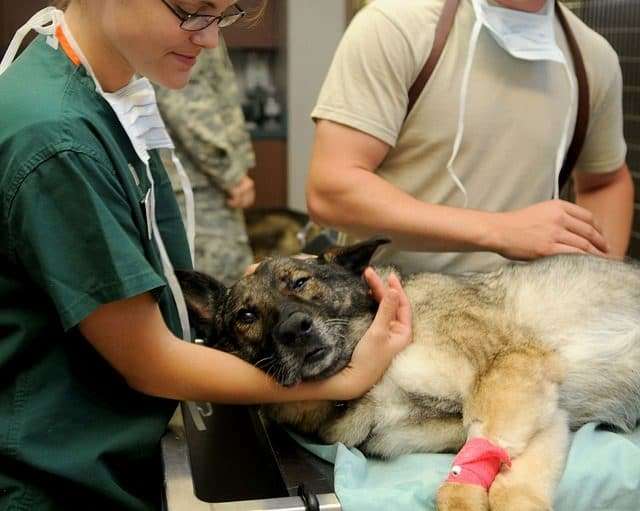
Is it hard becoming a veterinarian? Have you ever wondered what made your veterinarian choose that particular profession? Was it their childhood dream?
Is this career a good fit for their intellect and basic talents? Did you ever ask them any of these questions?
Have you ever considered becoming a veterinarian? Is this a profession you can imagine yourself enjoying? Are you an animal lover?
Others choose a career or profession based on their perceived benefits. Either way, there are basic interests and talents that must be present for their plans to work out.
Sometimes, personal interaction with an animal early in life drives a smaller group of people into veterinarian medicine. Often it is that experience that gives them a passion for taking care of animals. Watch this brief video clip for an example of this.
First, let’s look at some of the most commonly listed reasons for becoming a veterinaria. They are listed in no particular order.
- Love of animals
- Excellent salary
- Professional Independence and Autonomy
- Opportunity for Professional Entrepreneurship
- Interaction With the Community
- Lifetime Learning and Opportunity to Specialize
- Problem Solving Keeps One Alert and Engaged
- Multiple Career Options That Can Adjust with Personal Life Needs
- Professional Community With Like-Minded Individuals
What Does It Take To Become A Veterinarian, Education-Wise?
- High School
- A Bachelor’s Degree
- A Veterinary Medicine (DVM) Degree
- Veterinary Medicine Licensure
- Specialization (optional)
- Continuing Veterinary Medicine Education
Before Making Any Firm Decisions
You need to look further into both the profession and yourself. Do you know what is involved in the day to day activities of being a vet? Is it a good fit for you? Then take this next step.
Check out https://www.careerexplorer.com/career-test/ . to see if this is a reasonable career option for you.
Let’s Take A Look At The Steps A Little Closer, Depending Upon Where You Are In The Process of Becoming a Veterinarian
Certainly, if you are still in high school you need to prepare a solid foundation for veterinary medicine. You will need to get solid grades and a good understanding of a few subject areas. Take courses in Life, Physical, and Chemical Sciences.
Taking advancement placement or honors courses in biology, physics and chemistry will pay off big time. Having a solid understanding of these courses will make the next level of courses in college much easier.
Several basic science courses are required for application to Vet School later on. If you have the option, enroll in classes directly related to animal habitats and behavior.
You can take these courses at your high school or through online courses elsewhere. Courses in animal science, zoology, or oceanology will make your application to vet school much stronger.
Classes in Advanced Math are very helpful. Medical professionals must have a high level of proficiency in math. Most importantly, this level of understanding is vital for determining medication doses.
Math is also vital to understanding physiology and research studies upon which they will make medical decisions. Courses such as integrated math, statistics, algebra, trigonometry, and calculus prepare you for the higher-level math courses in college.
Medical schools today, both for humans and for animals, prefer to have articulate and well-rounded applicants. Being able to communicate and interact with patients or their owners is critical.
Courses in the humanities are now considered as valuable as those in math and science. Some of these courses are social studies, psychology, speech, communication, and English. They are seeking well-rounded applicants and look at more than just grades.
It Takes More Than Formal Education to Be A Successful Applicant
Real-life experience is important in many ways. Paid positions or volunteering at places where you interact and care for animals give you valuable experience. At a minimum, join an organization that teaches you about animal feeding and general care, (such as 4 H clubs).
Check out these opportunities.
- an animal shelter
- veterinary clinic
- zoo, whether exotic animals or domestic petting zoo
- farm
Bachelor’s Degree
To apply to Veterinary School, you must have a Bachelor of Science Degree. At one time, only a major in a Pre-Veterinary Science or some very closely related disciplines such as Biology, Zoology, Animal Science, or General Science would be considered.
Now, the admissions committees at the medical and veterinary schools are more willing to accept applicants who have majored in other areas. A few applicants now major in other areas, such as the humanities. Of course, the applicants must still have taken the required science courses listed in their catalog.
Extra-Curricular Requirements At The College Level
Most, if not all, veterinary schools will require applicants to have experience working with animals in an organized fashion. Often, applicants complete an internship during college to satisfy that requirement. Many such internships exist with veterinary clinics and hospitals, research facilities, animal farms, and zoos.
Here are a few links you will find helpful as you plan both undergraduate and graduate studies in Veterinary Medicine
https://www.thebalance.com/top-veterinary-schools-125916
Doctor of Veterinary Medicine (DVM) Degree
It takes four years to obtain a degree in veterinary medicine. Those four years are divided into two sections. Each section lasts two years. The first primarily follows a classroom format with labs included. The basic science courses are as follows.
- anatomy and physiology
- biology and microbiology
- epidemiology
- neurobiology
- pharmacology
- virology
Increasingly, integrative medicine, nutrition, and general business courses are becoming available within the DVM curriculum.
The second half of the four-year degree is comprised of clinical rotations. This is the exciting part. The clinical rotations are where they, under the supervision of a licensed veterinarian, provide hands-on animal care. They begin to make diagnoses and to recommend treatments.
The senior, or fourth year is traditionally spent in a practicum or externship. This can be completed at a veterinary clinic, hospital, or similar facility. Normally, it is during this applied experience that the vet students decide upon a specialty.
The Oath Taken Upon Graduation With A DVM Degree
“Being admitted to the profession of veterinary medicine, I solemnly swear to use my scientific knowledge and skills for the benefit of society through the protection of animal health and welfare, the prevention and relief of animal suffering, the conservation of animal resources, the promotion of public health, and the advancement of medical knowledge.
I will practice my profession conscientiously, with dignity, and in keeping with the principles of veterinary medical ethics. I accept as a lifelong obligation the continual improvement of my professional knowledge and competence.”
Veterinary Medicine Licensure
In order to practice in the United States, graduates of any DVM program must pass the NAVLE (North American Veterinary Licensing Exam). The test is comprised of “sixty pre-test questions and three hundred scored questions that test diagnostic skills, knowledge of animal species, and treatment procedures.”
It is administered under the auspices of the NBVME, (National Board of Veterinary Medical Examiners) You may find more info at https://students.fvas.unimelb.edu.au/admin/navle-guide.
Some States Require An Additional Examination
A number of states further require veterinarians to pass a state examination. It is designed to test the examinees’ knowledge of very specific jurisdictional regulations and laws.
The United States Bureau of Labor Statistics says that there are only a few states with reciprocity agreements. This means that most veterinarians licensed in one state and then move to another, cannot practice in the new state. That is, until they have passed all examinations required by the state in which they now reside.
Board Certification is an option.
There are two academic paths for board certification. You may choose to become certified immediately or after practicing for a while.
Once a graduate of Veterinary Medical School has become licensed, they can pursue board certification via residency. This is called the Practitioner Path.
The American Board of Veterinary Practitioners describes the two paths in this manner.
Residency Path
- Residents must complete either a rotating internship or at least one year in practice
- Complete a two- or three-year, ABVP-approved residency training program
- Submit two case reports taken from the preceding five years’ experience, or one case report in addition to one publication for review. This is in addition to other specialized documentation
- For a more detailed explanation of how this works click on the link below.
- https://abvp.com/residents-students/
Practitioner Path
- This path requires a minimum of 5 years of clinical veterinarian experience.
- The applicant must submit 2 case reports from the preceding 5 years experience, or submit one case report and one publication. Here are the details. of the other requirements.
- https://abvp.com/veterinary-certification/recognized-veterinary-specialties/
Specialization
One may choose to pursue an advanced-practice specialty. There are more than forty veterinary sub-disciplines from which to choose. Two of the more popular of these disciplines are animal internal medicine and oncology.
Continuing Education For The Veterinarian
All medical practitioners must obtain continued education to maintain their ability to practice. This is true whether for treating humans or animals. Many join local, state, and national medical associations to make this easier for them to maintain.
These associations provide access to resources for continuing medical education. Further, networking opportunities with other medical professionals is also a benefit of membership.
Here are links to some of the most well recognized national organizations in this field.
https://www.avma.org/Pages/home.aspx
Research and Teaching
Those veterinarians who wish to focus on pursuing research opportunities or who plan to teach at DVM programs will need to obtain a Ph.D. There are a few universities that offer programs combining the DVM/Ph.D. degrees








Thanks for the reminder that farms can also be a good place to look for veterinary internships. A friend of mine is aspiring to have a career like that in the future because he has always had an affinity for animals. Perhaps it would be best to look for places to get an internship ahead of time so that it would be a problem for him in the future.
Planning ahead is alwaysa good idea in these situations. Good luck for all those pursuing a career in veterinary medicine. We will always need well trained and compassionate vets to care for our fur babies!